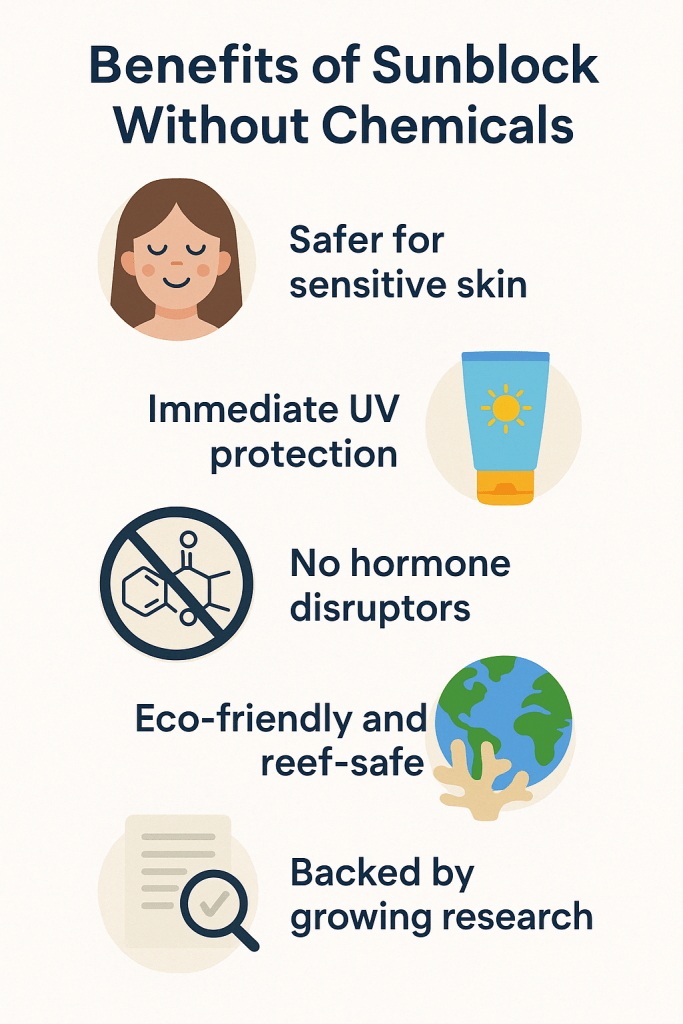More people are searching for sunblock without chemicals, and it’s not hard to see why. Research has revealed worrying links between certain sunscreen ingredients and health risks, including carcinogenic effects. Although sunscreen remains essential for skin protection, the kind you choose matters more than ever. Thankfully, safer, natural options are now widely available.
Sunblock Without Chemicals – The Problem With Traditional Sun Creams
When you look at many commercial sun creams, you’ll often find a long list of chemical ingredients. Substances like oxybenzone, octinoxate, and avobenzone are commonly used to absorb UV rays. However, research has shown that these chemicals can enter the bloodstream within hours of application. Worryingly, some studies suggest they may disrupt hormones and even contribute to cancer development.
Given that, it’s no surprise that many people are now seeking a sunblock without chemicals to protect both their skin and their overall health.
Sunblock Without Chemicals – What Makes a Sunblock Truly Chemical-Free?
In simple terms, a chemical-free sunblock uses natural mineral ingredients to shield the skin. Instead of absorbing UV rays, these minerals sit on the surface and reflect sunlight away. Two key ingredients to look out for are:
-
Zinc oxide: Offers broad-spectrum protection against UVA and UVB rays.
-
Titanium dioxide: Works well against UVB and short UVA rays.
Because these minerals do not penetrate the skin, they provide a safer and more gentle alternative. Choosing products based on these ingredients helps you avoid the potential dangers found in chemical sunscreens.
Sunblock Without Chemicals – Research Behind the Shift to Safer Options
It’s not just public opinion driving this change. Ongoing research has consistently raised concerns about chemical sunscreens. Studies have linked certain ingredients to hormone disruption, allergic reactions, and even cell damage when exposed to sunlight. Some research has even suggested that particular sunscreen chemicals may act as carcinogens after long-term use.
Although more investigation is needed, the evidence already available makes the choice for a sunblock without chemicals an easy one for many health-conscious consumers.
Benefits of Choosing Sunblock Without Chemicals
Making the switch to mineral-based sun protection offers several advantages. For starters, these products usually have fewer irritating additives, making them ideal for sensitive skin. Plus, they start working immediately upon application, unlike chemical sunscreens that require time to become effective.
Another important benefit is environmental protection. Chemicals like oxybenzone have been shown to harm coral reefs and marine life. Therefore, using a sunblock without chemicals helps protect not only your skin but also the planet.
Common Myths About Chemical-Free Sunblock’s
Some people worry that mineral sunscreens leave a heavy white cast. While this might have been true years ago, newer formulations have significantly improved. Modern products now blend well with different skin tones, offering invisible or lightly tinted options.
Others believe that chemical-free sunblock’s aren’t as effective. However, when applied correctly, mineral sunscreens offer excellent broad-spectrum protection. In fact, dermatologists often recommend them, especially for children and individuals with sensitive skin.
How to Pick the Right Natural Sunblock
Choosing the right sunblock without chemicals requires a little label-reading. Here’s what to check for:
-
Active ingredients should only list zinc oxide or titanium dioxide.
-
Avoid fragrances and preservatives, which can trigger skin irritation.
-
Look for reef-safe labels, especially if you swim in natural waters.
-
Opt for certified organic brands when possible for added reassurance.
By being mindful of these factors, you can enjoy safer sun exposure without worrying about harmful chemicals seeping into your system.
Are There Any Downsides?
While mineral sunscreens are safer, they do require a bit more attention. They can rub off more easily, especially during water activities or sweating, meaning you need to reapply more frequently. Additionally, some thicker formulations might feel heavier than chemical alternatives.
Still, most people find these minor inconveniences are a small price to pay for peace of mind. When your health and the environment are both better protected, it’s easy to see why mineral sunblock’s are growing in popularity.
Final Thoughts
Switching to a sunblock without chemicals is a smart choice for anyone concerned about long-term health and environmental impact. With research continuing to reveal the risks of chemical sunscreens, opting for natural, mineral-based options provides safer, effective protection.
If you’re planning to spend time outdoors, making the right sunblock choice ensures your skin stays safe without any hidden dangers. Always remember to reapply as needed and enjoy the sunshine with confidence.
Here is a related article that you may well enjoy if you found the above of value.
Choosing sun protection without harsh chemicals fits naturally with creating a healthier, low-toxin lifestyle for everyday living. If you would like to explore this further, our guide on Toxic Free Living looks at how reducing unnecessary chemical exposure, including personal care choices, can support a calmer, more conscious approach to wellbeing and eco-friendly living.
